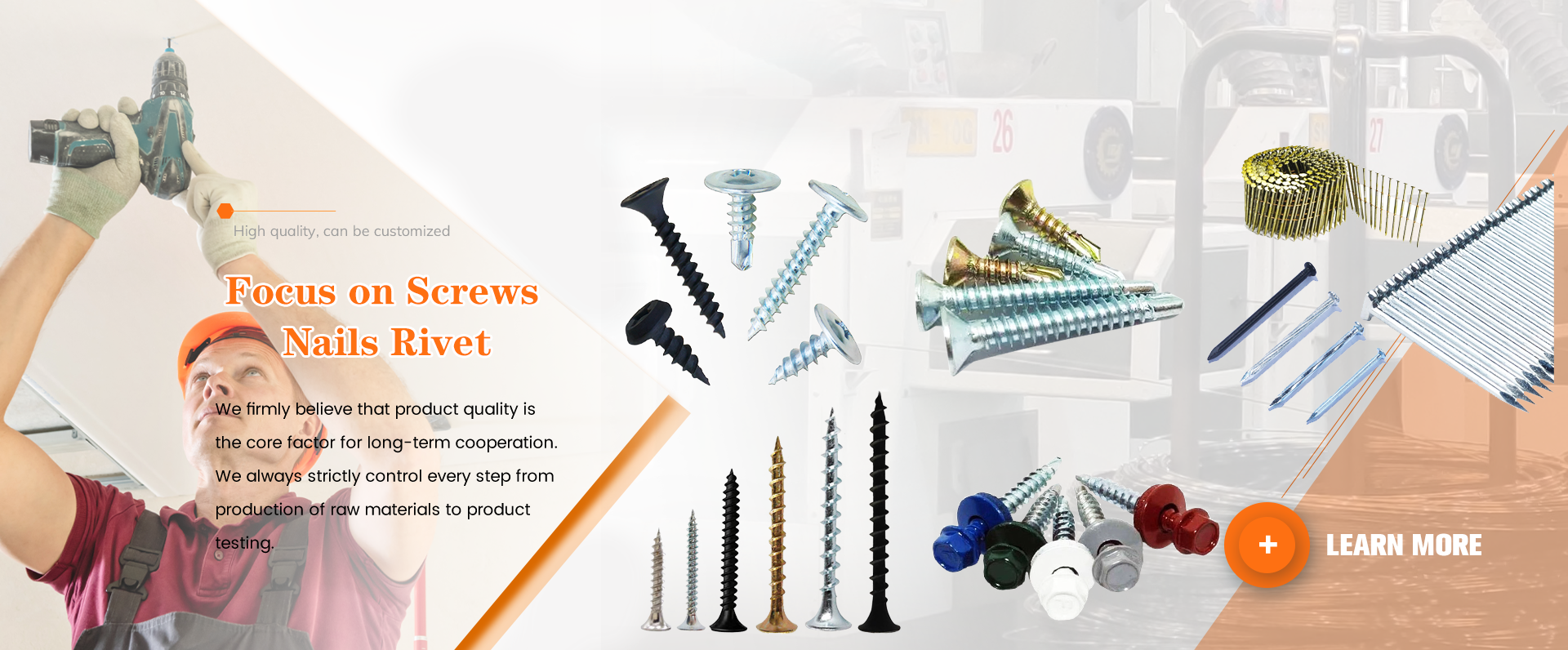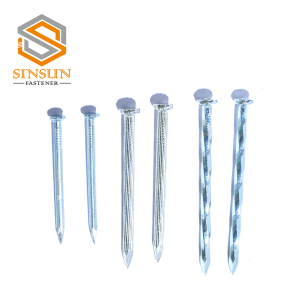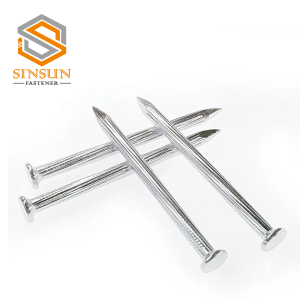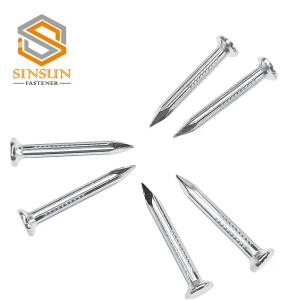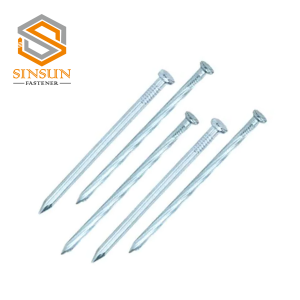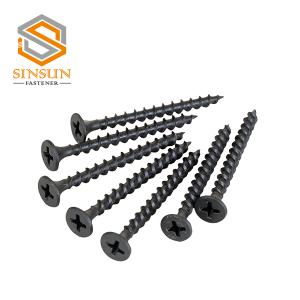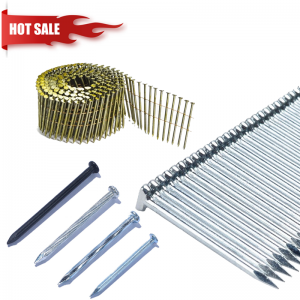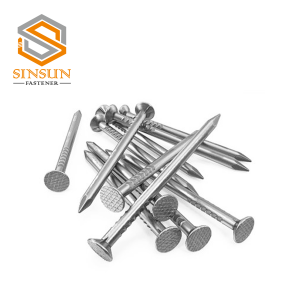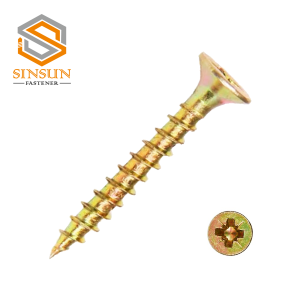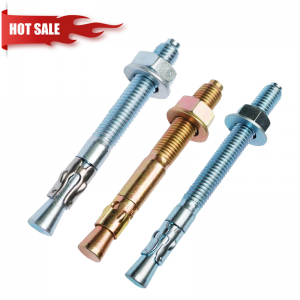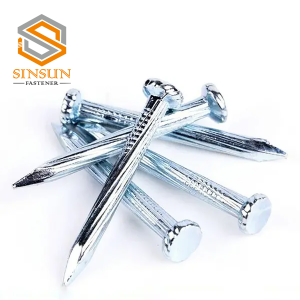Galvanized Fluted Masonry Nails


Grooved concrete nails, also known as masonry nails or concrete nails, are specialized fasteners used to secure materials to concrete, brick, or masonry surfaces. The handles of these nails are designed with deep spiral grooves to provide enhanced grip and retention when driving into hard surfaces. Here are some key features and considerations for grooved concrete nails: Materials: Fluted concrete nails are typically made of hardened steel or other durable materials that can withstand the force of hammering against a hard surface. Shank Design: Grooves or spiral grooves along the nail shank help create a tight bond between the nail and the concrete or masonry surface. They enhance grip and minimize the chance of nails slipping or pulling out. Tip: The tip of a slotted concrete nail is usually sharp and pointed, allowing it to penetrate hard materials more easily. It is important to ensure that the nails are properly aligned before driving them into the surface. Sizes and Lengths: Fluted concrete nails come in a variety of sizes and lengths to suit different applications. The correct size and length depends on the thickness of the material being fastened and the load or weight the nail needs to support. Installation: Pre-drilling holes is often required before driving grooved concrete nails to prevent cracking or spalling of the concrete or masonry surface. The diameter of the hole should be slightly smaller than the shank of the nail to ensure a secure fit. Tools: Fluted concrete nails are driven into the surface, typically using a hammer or a specialized nail gun designed for masonry work. Make sure you have the proper tools and follow safety protocols when handling them. Grooved concrete nails are commonly used in construction, carpentry and other applications that require a strong and reliable fastening solution to concrete or masonry. They are often used to secure baseboards, moldings, moldings or other materials to concrete walls, floors or other masonry surfaces.
Masonry Nails For Concrete
Mushroom Head Concrete Nail
Electrical Galvanized Concrete Nail
Galvanized Concrete Nail Type
There are complete types of steel nails for concrete, including galvanized concrete nails, color concrete nails, black concrete nails, bluish concrete nails with various special nail heads and shank types. Shank types include smooth shank, twilled shank for different substrate hardness. With above features, concrete nails offer excellent piecing and fixing strength for firm and strong sites.

Size For Fluted Masonry Nails

Product Video of Nails For Concrete Walls

Mushroom Head Concrete Nail Application
Mushroom head concrete nails have a unique head shape that resembles a mushroom, hence the name. This type of nail is specifically designed for applications where a more aesthetically pleasing or smoother finish is desired. Here are some common uses for mushroom head concrete nails:Finishing work: Mushroom head concrete nails are often used in finishing applications where the exposed nail heads need to be concealed or blended in more seamlessly with the surrounding material. They are commonly used for attaching trim, molding, or decorative elements to concrete or masonry surfaces.Exterior siding: Mushroom head concrete nails can be used for securing exterior siding, such as vinyl or metal, to concrete or masonry walls. The mushroom-shaped head provides a larger surface area, helping to prevent the nail from pulling through the siding material.Paneling and sheathing: In construction projects involving paneling or sheathing, such as plywood or fiber cement boards, mushroom head concrete nails can be used to securely fasten these materials to concrete or masonry surfaces. The larger head helps to distribute the load and minimize damage to the panels.Temporary installations: Mushroom head concrete nails can also be useful for temporary installations or situations where the nails may need to be removed later. The mushroom head shape allows for easier removal without leaving a significant mark or hole in the surface.Remember to always choose the appropriate nail size and length based on the specific application and the thickness of the material being fastened. Additionally, proper installation techniques, such as pre-drilling pilot holes and using the correct tools, should be followed to ensure a secure and effective attachment.

Masonry Nails For Concrete Surface Treatment
Bright Finish
Bright fasteners have no coating to protect the steel and are susceptible to corrosion if exposed to high humidity or water. They are not recommended for exterior use or in treated lumber, and only for interior applications where no corrosion protection is needed. Bright fasteners are often used for interior framing, trim and finish applications.
Hot Dip Galvanized (HDG)
Hot dip galvanized fasteners are coated with a layer of Zinc to help protect the steel from corroding. Although hot dip galvanized fasteners will corrode over time as the coating wears, they are generally good for the lifetime of the application. Hot dip galvanized fasteners are generally used for outdoor applications where the fastener is exposed to daily weather conditions such as rain and snow. Areas near the coasts where the salt content in rain water is much higher, should consider Stainless Steel fasteners as salt accelerates the deterioration of the galvanization and will accelerate corrosion.
Electro Galvanized (EG)
Electro Galvanized fasteners have a very thin layer of Zinc that offers some corrosion protection. They are generally used in areas where minimal corrosion protection is needed such as bathrooms, kitchens and other areas that are susceptible to some water or humidity. Roofing nails are electro galvanized because they are generally replaced before the fastener begins to wear and are not exposed to harsh weather conditions if installed properly. Areas near the coasts where salt content in rain water is higher should consider a Hot Dip Galvanized or Stainless Steel fastener.
Stainless Steel (SS)
Stainless steel fasteners offer the best corrosion protection available. The steel may oxidize or rust over time but it will never lose its strength from corrosion. Stainless Steel fasteners can be used for exterior or interior applications and generally come in 304 or 316 stainless steel.

